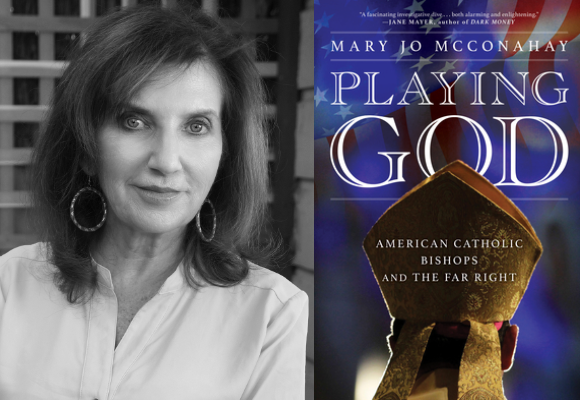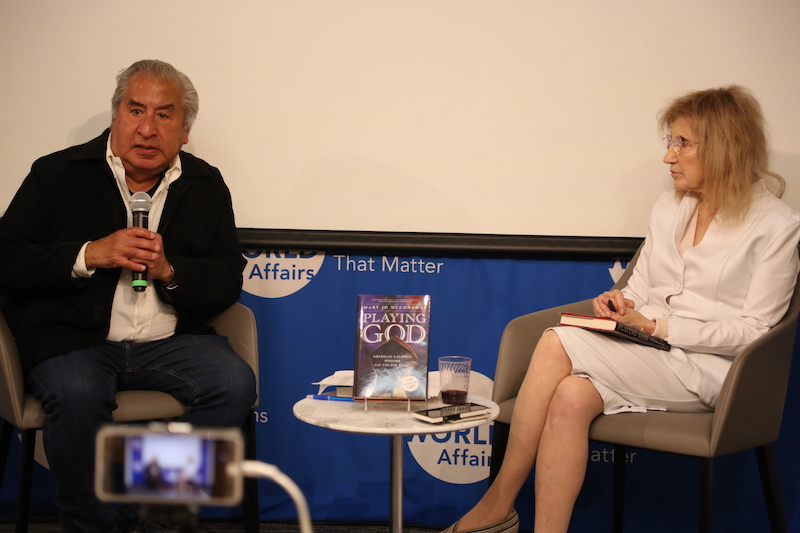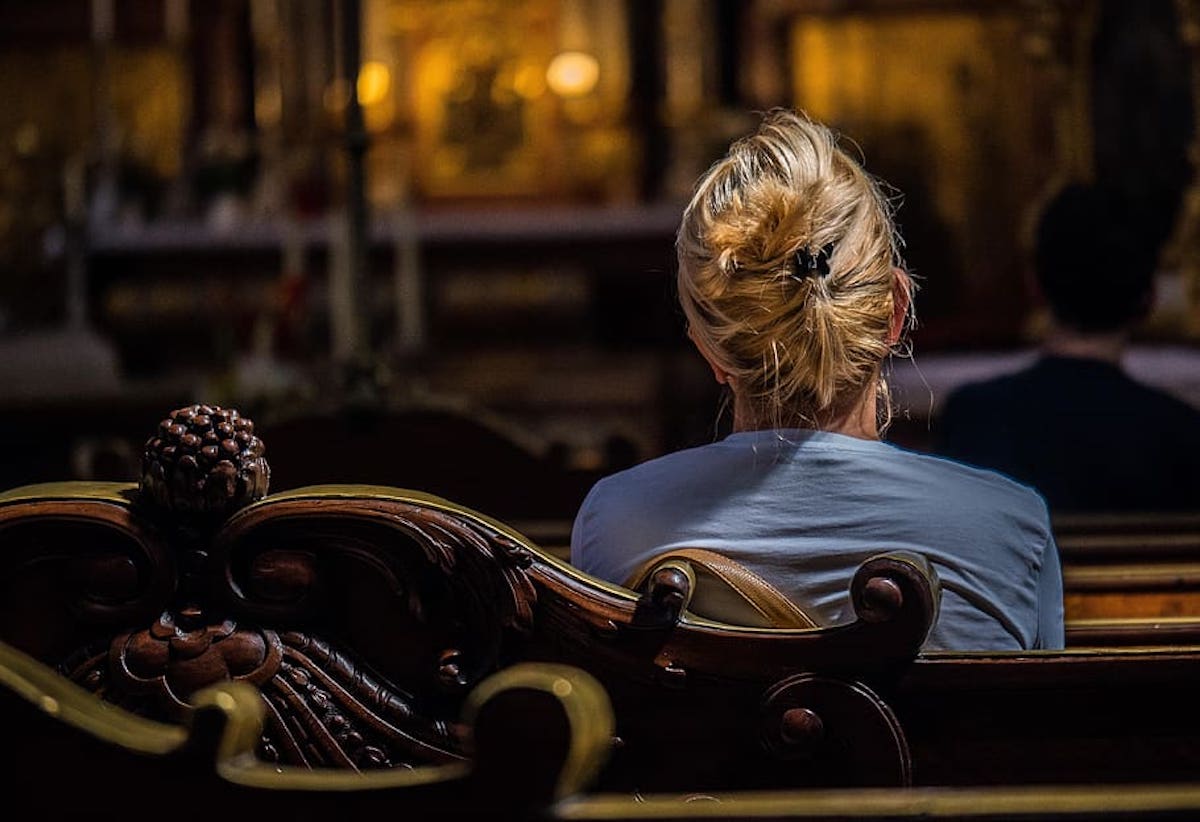At the start of the COVID pandemic, amid the lockdowns, fear and isolation, San Francisco’s top Catholic leader called on congregants to gather en masse in front of City Hall. The move was a direct challenge to local authorities then working to slow the spread of the deadly virus.
According to author Mary Jo McConahay, that was exactly the point.
Archbishop Salvatore Cordileone and other ultraconservative Church leaders in the US, writes McConahay in her new book, Playing God: American Catholic Bishops and the Far Right, “took advantage of the opportunity presented by COVID to posit Church authority against that of the state.”
Shunning masks and disparaging vaccines, Church leaders here stood in open defiance of public policy, of the scientists working to save lives, and of the guidance of their own pontiff, Pope Francis, who appealed to Catholics worldwide to get vaccinated as an “act of love.”
McConahay, a veteran journalist who spent years covering conflict and social unrest in Latin America and the Middle East, describes herself as a “cradle Catholic,” someone who as a young girl attending Immaculate Conception Grammar School in Monrovia, California desperately wanted to serve as an altar boy. “I grew up absorbing everything the Church had to give.”

Yet despite her faith – indeed, because of it – she’s taken an unflinching look at what she describes as the rightward lurch among America’s top clergy, a shift fueled by visions of a Christian nationalism long associated with right-wing evangelical movements, and at odds with decades of reform since Vatican II and with the social justice movements of today and yesteryear.
And, says McConahay, that transformation is being funded by the same streams of dark money empowering a newly resurgent far-right in this country.
“Charles Koch supports 40 Catholic Universities. None of the Bishops turned down that money, even though it comes from fossil fuels and other dirty industries,” says McConahay, pointing to Francis’ critiques of capitalism and the environmental damage it has wrought as an example of the widening breach between American Catholicism and the more “pastoralist” approach advocated by the Pope and his supporters.
That divide, she adds, has implications that go beyond the Church and its adherents.
“The more you have leaders like this trying to undermine state authority, the more you are slipping into autocracy,” says McConahay. “This cohort of US Bishops believes what is good for them from a doctrinal point of view is good for the rest of the country. And that’s dangerous. Its anti-democratic and a threat to democracy.”
Six of the nine justices on the US Supreme Court are Catholic, a majority of them adhering to the more conservative views espoused by American Bishops. Meanwhile, among the roughly 60 million Catholics in the US today, a majority – six-in-ten as of 2021 – have expressed a favorable opinion of Pope Francis.
McConahay’s book comes amid an onslaught of sex abuse scandals, the latest emerging just this week out of Baltimore, where priests are accused of abusing more than 600 victims over the course of nearly four decades. The scandals have rocked local diocese, with several here in California having already filed for bankruptcy or considering doing so as they contend with mounting legal fees.
They also land during Holy Week as millions of Catholics prepare to celebrate Easter. For McConahay, the news is yet more proof of the need to rid the Church of the “clericalism” that assumes priests and bishops can do no wrong and that allows for the continued attempt to cover up for the abuse.

“The extent to which clericalism is extinguished in the church, that the church becomes the people of God… we will have more tools at hand to fight this kind of thing.”
McConahay spoke at an event this past week in San Francisco organized by Ethnic Media Services to mark the launch of her book. The gathering was moderated by noted author and essayist Richard Rodriguez. (Both McConahay and Rodriguez spent much of their early careers writing for Pacific News Service, a forerunner of EMS.)
A gay man and a devout Catholic, Rodriguez has long wrestled in his writings and in public speaking engagements with the juxtaposition of those two identities. Yet with the growing conservative tenor of the US Church – even in famously liberal San Francisco, where Rodriguez attends mass – he now sees his own obsolescence in the church as a part of its future.
“We understand what the game is,” says Rodriguez, recalling a Valentine’s Day tradition at his Church where couples are asked to stand for applause. Richard and his partner of nearly four decades do not stand. “It is to celebrate he and she.”
Today’s church, he adds, is “devoid of tenderness.”
And yet for McConahay, it is that ostracization and marginalization that excites and invigorates her faith, a faith she says was deepened over the course of reporting for her book. “I believe in the core teachings of the Church, in the value of human life and the necessity to reach out to the other, no matter who the person is.”
The Church espoused by this current crop of American Bishops, in McConahay’s telling, is a far cry from that founding principle, a division she says “mirrors the extreme divisions we have in this country. And rather than standing for pulling us together, Church leaders have planted themselves on one side of that division.”
Toward the end of their conversation, Rodriguez shares his experience with a conservative priest who years earlier had invited him to lunch out of a genuine interest in dialogue. It was the first time a member of the clergy had invited him to break bread and to listen.
For Rodriguez, McConahay’s book is just such an invitation, an opportunity for those in the pews to engage with the Church hierarchy, to have their voices heard.
“Maybe you should invite Cordileone to lunch,” he suggests.
Maybe I will, McConahay replies.
MaryJo McConahay is the author of several books, including The Tango War: The Struggle for the Hearts, Minds and Riches of Latin America During World War II. Her latest book is Playing God: American Catholic Bishops and the Far Right




